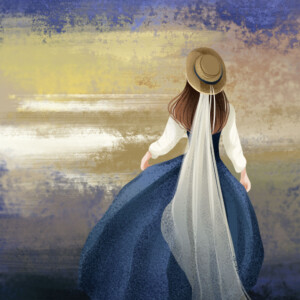
"Jane Eyre" is a classic novel written by Charlotte Brontë and published in 1847. The story revolves around the eponymous character, Jane Eyre, who narrates her own life experiences. It is a coming-of-age tale that explores themes of love, social class, morality, and independence.
The story begins with Jane as a young orphan girl living with her cruel aunt and cousins. She endures mistreatment and neglect until she is sent away to Lowood School, a charity institution. At Lowood, Jane faces harsh conditions but befriends Helen Burns, who supports her emotionally. After some time, a typhus outbreak leads to the death of several students, including Helen.
Eventually, Jane becomes a teacher at Lowood, but she yearns for more in life. She applies for a position as a governess at Thornfield Hall, where she meets Mr. Edward Rochester, the enigmatic and brooding master of the house. Jane develops feelings for Rochester, and their relationship deepens despite their differences in social class and age.
However, as their romance progresses, Jane discovers a dark secret: Rochester is already married to Bertha Mason, a mentally unstable woman he keeps locked in the attic. This revelation shatters Jane's hopes of a future with Rochester, and she flees Thornfield to preserve her integrity.
Jane finds herself penniless and destitute, but she is taken in by St. John Rivers and his sisters. They offer her shelter and later reveal that they are her long-lost relatives. St. John encourages Jane to marry him and join him on a missionary trip to India. Although tempted by the prospect of a stable life, Jane realizes she cannot deny her love for Rochester.
Driven by her love for him, Jane returns to Thornfield only to discover it burned down due to Bertha's destructive actions. Rochester, now blind and injured, has survived the fire. Jane reunites with him, and they confess their feelings. In the end, they marry and find happiness together.
"Jane Eyre" is a captivating tale that delves into Jane's journey from an oppressed young girl to a strong, independent woman who overcomes societal constraints to find love and self-fulfillment.
Chapter 2:What is Jane Eyre famous for
It is known for its compelling and independent female protagonist, Jane Eyre, who defies societal expectations and seeks self-fulfillment. The novel explores themes of love, social class, morality, and the struggle for personal identity. Jane Eyre's enduring popularity is attributed to its exploration of complex characters, its emotional depth, and its portrayal of feminist ideas ahead of its time.
Chapter 3:Jane Eyre themes
Social class and hierarchy: The novel delves into the rigid social structure of Victorian England, where individuals were often judged and treated based on their social status. Jane's journey reflects the challenges faced by a young woman of low birth trying to navigate a society driven by class distinctions.
Gender roles and women's independence: Jane Eyre challenges the conventional gender roles of the time by presenting a strong-willed and independent female protagonist. Jane resists societal expectations placed upon women, seeking personal fulfillment and equality, ultimately questioning traditional notions of femininity.
Love and passion: Love is a central theme in Jane Eyre. The novel explores various forms of love, including romantic, familial, and platonic. The passionate love that develops between Jane and Mr. Rochester challenges societal norms and expectations, highlighting the power of love as a force that transcends social constraints.
Morality and religion: Religion plays a significant role in the novel, particularly through Jane's struggles with her faith and moral principles. Jane grapples with questions of morality, forgiveness, and personal integrity, ultimately finding her own path to spirituality.
Independence and self-discovery: Throughout the story, Jane seeks independence and strives to assert her individuality. Her journey represents a quest for self-discovery and personal growth, as she overcomes obstacles, learns from her experiences, and ultimately finds her own identity.
Appearance vs. reality: The theme of appearance versus reality is explored through characters such as Bertha Mason and Mr. Rochester. The novel highlights the danger of making judgments based solely on outward appearances, emphasizing the importance of looking beyond superficial qualities to understand someone's true nature.
More Episodes
 2024-04-14
2024-04-14
 10
10
 2024-03-31
2024-03-31
 11
11
 2024-03-23
2024-03-23
 14
14
Create your
podcast in
minutes
- Full-featured podcast site
- Unlimited storage and bandwidth
- Comprehensive podcast stats
- Distribute to Apple Podcasts, Spotify, and more
- Make money with your podcast
It is Free
- Privacy Policy
- Cookie Policy
- Terms of Use
- Consent Preferences
- Copyright © 2015-2024 Podbean.com






